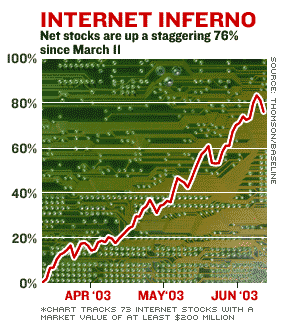NEW YORK (CNN/Money) -
Internet mania is back with a vengeance.
The sector is one of the hottest performing groups of the market this year. According to Thomson/Baseline, the 73 Internet stocks with a market value of at least $200 million are up an average of 65 percent this year and 76 percent since March 11.
And while industry giants such as Yahoo!, Amazon.com and eBay have all enjoyed substantial gains this year, the Net's biggest winners are much smaller -- the industry's second- and third-tier companies.
Shares of Ask Jeeves, the search engine named for the jovial butler in the P.G. Wodehouse novels, are up a stunning 377 percent year-to-date. Priceline.com's stock has gained 146 percent and Drugstore.com has surged 130 percent.
What gives?
Betting on the second tier
Niche small-cap companies like Ask Jeeves, online DVD rental service Netflix, and Opsware, the Internet software company formerly known as LoudCloud, have done well this year because they have demonstrated relatively strong revenue growth.
But Michael Mahoney, managing director with EGM Capital, which runs a hedge fund focusing on tech, telecom and media companies, said investors are getting overly excited about most Internet stocks, even though there are only a handful of companies that will be long-term winners.

With that in mind, his only major Internet holding is USA Interactive, Barry Diller's acquisitive e-commerce conglomerate. It is in the process of buying the remainder of Expedia and Hotels.com, as well as online financial services company Lending Tree.
"We're not chasing the really tiny companies that have moved enormous amounts," said Mahoney. "The core companies with meaningful franchises are the places to be."
Stewart Barry, an analyst with Delafield Hambrecht, a Seattle-based boutique investment bank, also said that investors should be more selective. For example, Barry has a "sell" rating on Drugstore.com because he doesn't expect it to report a profit, based on generally accepted accounting principles, until 2005.
But he has "buy" ratings on aQuantive and ValueClick, two small-cap Internet advertising companies that have experienced big runups this year, because both are profitable. "Unlike the first Internet boom, there are better fundamentals supporting these companies," he said.
More Nets are profitable, but they're not cheap
To be sure, the emergence of profitable Internet companies makes the current frothiness a lot different from the bubble of the late 1990s. Forty of the 73 companies are expected to be profitable this year, a refreshing change from the late 1990s, when few Net outfits were making money (and few investors cared about the losses).
| * based on prices as of 6/9 | | Source: Thomson/Baseline |
|
Still, those 40 stocks trade at an average of 50 times 2003 earnings estimates, more than 2.5 times the multiple for the S&P 500 and 1.5 times the average valuation for the S&P technology sector.
That has even Net bulls a little worried.
Youssef Squali, an analyst with First Albany, said that profitable Internet companies like Ask Jeeves, Findwhat.com (another search engine company) and United Online, which operates dial-up Internet access services Juno and Netzero, deserved to pop this year because they were clearly oversold last fall when investors feared the worst for most Internet companies.
But he concedes that there is less room to run for these stocks. All three are rapidly approaching his price targets and he said that he would not raise them just because of momentum. There needs to be a fundamental reason to do so.
As investors learned the hard way in 2000, stocks with rich valuations can take a big fall if they don't continue to deliver.
Barry owns shares of ValueClick but does not own shares of other companies he follows. Squali does not own any of the stocks he covers. Delafield Hambrecht and First Albany have not performed investment banking for the companies mentioned in this article.

|

